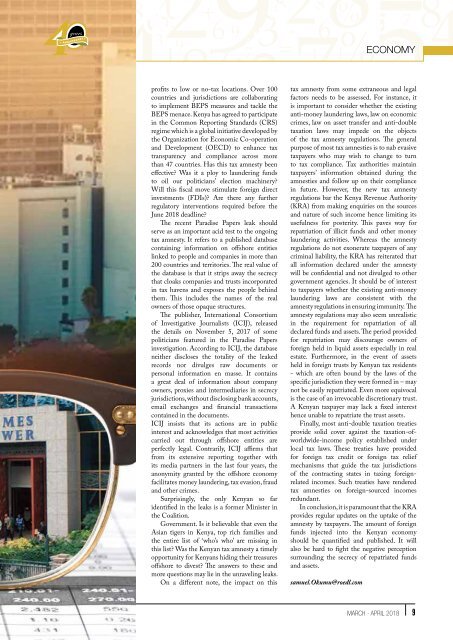The-Accountant-Mar-Apr-2018
You also want an ePaper? Increase the reach of your titles
YUMPU automatically turns print PDFs into web optimized ePapers that Google loves.
ECONOMY<br />
profits to low or no-tax locations. Over 100<br />
countries and jurisdictions are collaborating<br />
to implement BEPS measures and tackle the<br />
BEPS menace. Kenya has agreed to participate<br />
in the Common Reporting Standards (CRS)<br />
regime which is a global initiative developed by<br />
the Organization for Economic Co-operation<br />
and Development (OECD) to enhance tax<br />
transparency and compliance across more<br />
than 47 countries. Has this tax amnesty been<br />
effective? Was it a ploy to laundering funds<br />
to oil our politicians’ election machinery?<br />
Will this fiscal move stimulate foreign direct<br />
investments (FDIs)? Are there any further<br />
regulatory interventions required before the<br />
June <strong>2018</strong> deadline?<br />
<strong>The</strong> recent Paradise Papers leak should<br />
serve as an important acid test to the ongoing<br />
tax amnesty. It refers to a published database<br />
containing information on offshore entities<br />
linked to people and companies in more than<br />
200 countries and territories. <strong>The</strong> real value of<br />
the database is that it strips away the secrecy<br />
that cloaks companies and trusts incorporated<br />
in tax havens and exposes the people behind<br />
them. This includes the names of the real<br />
owners of those opaque structures.<br />
<strong>The</strong> publisher, International Consortium<br />
of Investigative Journalists (ICIJ), released<br />
the details on November 5, 2017 of some<br />
politicians featured in the Paradise Papers<br />
investigation. According to ICIJ, the database<br />
neither discloses the totality of the leaked<br />
records nor divulges raw documents or<br />
personal information en masse. It contains<br />
a great deal of information about company<br />
owners, proxies and intermediaries in secrecy<br />
jurisdictions, without disclosing bank accounts,<br />
email exchanges and financial transactions<br />
contained in the documents.<br />
ICIJ insists that its actions are in public<br />
interest and acknowledges that most activities<br />
carried out through offshore entities are<br />
perfectly legal. Contrarily, ICIJ affirms that<br />
from its extensive reporting together with<br />
its media partners in the last four years, the<br />
anonymity granted by the offshore economy<br />
facilitates money laundering, tax evasion, fraud<br />
and other crimes.<br />
Surprisingly, the only Kenyan so far<br />
identified in the leaks is a former Minister in<br />
the Coalition.<br />
Government. Is it believable that even the<br />
Asian tigers in Kenya, top rich families and<br />
the entire list of ‘who’s who’ are missing in<br />
this list? Was the Kenyan tax amnesty a timely<br />
opportunity for Kenyans hiding their treasures<br />
offshore to divest? <strong>The</strong> answers to these and<br />
more questions may lie in the unraveling leaks.<br />
On a different note, the impact on this<br />
tax amnesty from some extraneous and legal<br />
factors needs to be assessed. For instance, it<br />
is important to consider whether the existing<br />
anti-money laundering laws, law on economic<br />
crimes, law on asset transfer and anti-double<br />
taxation laws may impede on the objects<br />
of the tax amnesty regulations. <strong>The</strong> general<br />
purpose of most tax amnesties is to nab evasive<br />
taxpayers who may wish to change to turn<br />
to tax compliance. Tax authorities maintain<br />
taxpayers’ information obtained during the<br />
amnesties and follow up on their compliance<br />
in future. However, the new tax amnesty<br />
regulations bar the Kenya Revenue Authority<br />
(KRA) from making enquiries on the sources<br />
and nature of such income hence limiting its<br />
usefulness for posterity. This paves way for<br />
repatriation of illicit funds and other money<br />
laundering activities. Whereas the amnesty<br />
regulations do not exonerate taxpayers of any<br />
criminal liability, the KRA has reiterated that<br />
all information declared under the amnesty<br />
will be confidential and not divulged to other<br />
government agencies. It should be of interest<br />
to taxpayers whether the existing anti-money<br />
laundering laws are consistent with the<br />
amnesty regulations in ensuring immunity. <strong>The</strong><br />
amnesty regulations may also seem unrealistic<br />
in the requirement for repatriation of all<br />
declared funds and assets. <strong>The</strong> period provided<br />
for repatriation may discourage owners of<br />
foreign held in liquid assets especially in real<br />
estate. Furthermore, in the event of assets<br />
held in foreign trusts by Kenyan tax residents<br />
- which are often bound by the laws of the<br />
specific jurisdiction they were formed in – may<br />
not be easily repatriated. Even more equivocal<br />
is the case of an irrevocable discretionary trust.<br />
A Kenyan taxpayer may lack a fixed interest<br />
hence unable to repatriate the trust assets.<br />
Finally, most anti-double taxation treaties<br />
provide solid cover against the taxation-ofworldwide-income<br />
policy established under<br />
local tax laws. <strong>The</strong>se treaties have provided<br />
for foreign tax credit or foreign tax relief<br />
mechanisms that guide the tax jurisdictions<br />
of the contracting states in taxing foreignrelated<br />
incomes. Such treaties have rendered<br />
tax amnesties on foreign-sourced incomes<br />
redundant.<br />
In conclusion, it is paramount that the KRA<br />
provides regular updates on the uptake of the<br />
amnesty by taxpayers. <strong>The</strong> amount of foreign<br />
funds injected into the Kenyan economy<br />
should be quantified and published. It will<br />
also be hard to fight the negative perception<br />
surrounding the secrecy of repatriated funds<br />
and assets.<br />
samuel.Okumu@roedl.com<br />
MARCH - APRIL <strong>2018</strong> 9

















